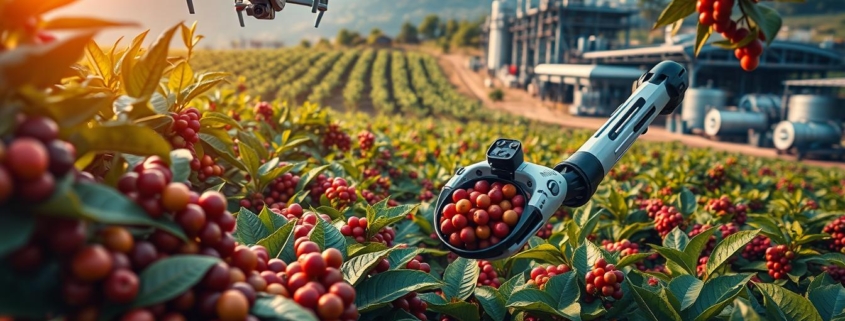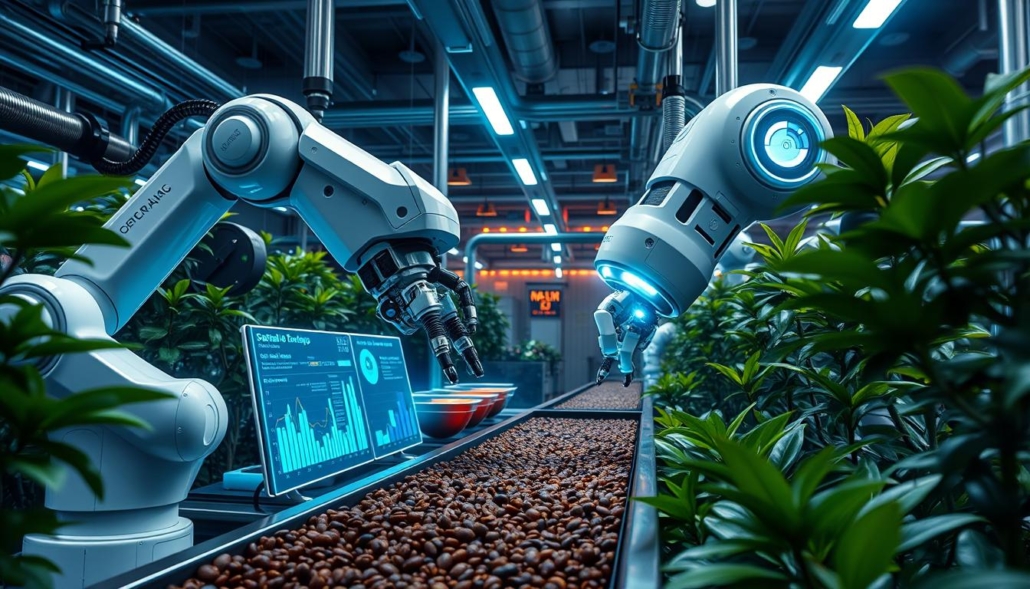Artificial Intelligence (AI) in Coffee Production: Brewing Innovation
The rapid emergence of Artificial Intelligence (AI) in Coffee Production is reshaping the industry, from the earliest stages of cultivation to the final cup of java. This coffee industry innovation leverages cutting-edge technology to enhance the efficiency and quality of every process within the coffee supply chain. Technological advancements are now at the heart of farming practices, ensuring that traditional methods are both preserved and improved. As we delve deeper, we’ll uncover the transformative impact of AI and why embracing this evolution is vital for the future sustainability and growth of the coffee industry.

Introduction to AI in Coffee Production
Artificial Intelligence (AI) is changing many industries, including coffee production. It uses machine learning and data analytics to help farmers. This makes farming better, more efficient, and sustainable.
The Importance of Technology in Modern Farming
AI and machine learning in agriculture are key in modern farming. They help farmers make quick decisions based on data. This leads to better resource use and higher crop yields. AI also helps with pest control, soil health, and disease detection, making farming sustainable.
Historical Perspective of Coffee Production
The history of coffee cultivation goes back centuries. It used to rely on manual labor and simple tools. But, with modern farming techniques, especially AI in coffee production, the industry has evolved. It now faces new challenges and opportunities.
Precision Farming for Coffee
Precision farming for coffee has changed the way we farm. It uses smart sensors and data analytics to give insights. This was not possible before.
Role of Smart Sensors in Coffee Cultivation
Smart sensors for coffee cultivation monitor soil moisture, temperature, and crop health. They provide real-time data for better irrigation and fertilization decisions. Companies like John Deere and Agri-Tech have introduced these devices, changing coffee farms worldwide.
Data Analytics in Coffee Supply Chain
Data analytics in the coffee supply chain tracks every stage, from growing to distribution. It analyzes patterns and predicts trends. This helps producers manage resources better, reduce waste, and maintain quality. It’s a big change, making the industry more transparent and efficient.
Benefits of Precision Farming for Coffee Producers
Precision farming for coffee producers has many advantages:
- Enhanced Resource Management: Smart sensors and data analytics help use water, fertilizers, and pesticides better, reducing waste and environmental impact.
- Improved Crop Quality: Monitoring and adjusting cultivation practices ensures high-quality coffee beans.
- Yield Prediction: Data analytics helps farmers predict yields, improving planning and supply chain management.
- Cost Savings: Optimizing inputs and processes saves money for coffee producers.
The use of smart sensors for coffee cultivation and data analytics in the coffee supply chain are crucial. They drive the future of coffee production towards better profitability and sustainability.
AI in Coffee Production Techniques
AI has brought new techniques to the coffee industry. It includes robotic coffee harvesting and automated coffee processing. These technologies have greatly changed traditional coffee production.
Robotic Coffee Harvesting
Robotic coffee harvesting uses AI machines to pick coffee cherries. These robots can tell the difference between ripe and unripe cherries. This means only the best cherries are picked.
This method cuts down on human mistakes and boosts the yield. Using robotic coffee harvesting can also save on labor costs. It makes the harvest process more efficient and precise.
- Benefits:
- Selective cherry picking
- Increased precision and efficiency
- Reduced labor costs
Automated Coffee Processing
Automated coffee processing uses AI to handle the whole coffee process, from sorting to roasting. This method ensures beans are treated consistently. This is key for maintaining high-quality coffee.
It also allows for constant monitoring and adjustments. This can improve the flavor and aroma of the coffee.
- Steps in Automated Coffee Processing:
- Bean Sorting
- Roasting
- Cooling
- Packaging
AI in coffee production shows how technology can improve traditional methods. It leads to better products and more efficient operations.
AI-Driven Quality Control in Coffee
Technology has changed AI-driven quality control in coffee for the better. Computer vision for coffee bean sorting lets AI systems spot even small defects. This ensures only top-quality beans are used.
Machine learning algorithms also predict flavor profiles. They analyze lots of data to forecast taste and aroma. This ensures every batch meets quality standards.

This approach has greatly improved coffee taste and consistency. Computer vision for coffee bean sorting helps producers sort and grade beans carefully. This elevates the final product’s quality and flavor.
This technology is changing the coffee industry. It makes the production process more efficient, precise, and reliable.
Conclusion
AI in coffee production is bringing a new era of efficiency and quality. AI technologies, like smart sensors and automated harvesting, improve the process. They lead to better yields, quality, and sustainable farming.
AI in quality control also ensures only the best beans reach consumers. This sets high standards in the market. AI is key for coffee producers to stay competitive and meet consumer demands.
The future of AI in agriculture looks bright. It could reduce costs and increase efficiency. It could also help make farming more sustainable. Embracing AI is a strategic move for the future of coffee production.














